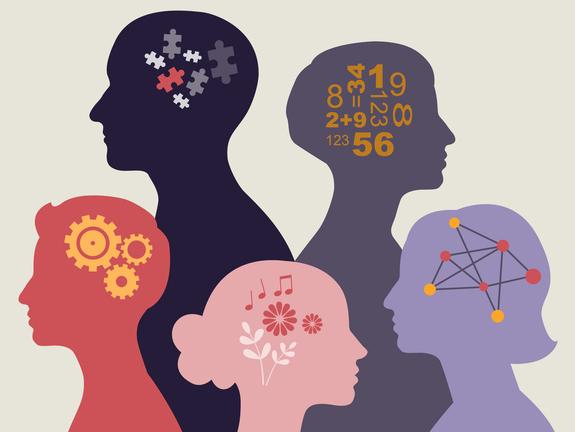
How to support neurodivergent postgraduate researchers

You may also like
The PhD community is neurodiverse. It includes researchers whose brains work in different ways, and some of those researchers will be neurodivergent. Being prepared to provide neurodiversity-affirmative PhD supervision means being prepared to understand and support all types of thinkers. When supporting neurodivergent PhD students, it means being prepared to understand neurodiversity and consider how best to feed this understanding into supervision practices, especially where students may have additional needs that require focused support.
The number of neurodivergent university students is rapidly increasing. At postgraduate research level, 16 per cent of students reported a known disability in 2022-23, up from 10 per cent in 2018-19, according to HESA data. More students are reporting developmental conditions, learning differences, social/communication conditions or multiple impairments – all of which may be associated with neurodivergence – than ever before.
- Five steps to support autistic students on their higher education journey
- How can we make the university experience more inclusive for neurodivergent students?
- Adult ADHD and higher education: improving the student experience
Of 192 STEM-based disabled PhD students surveyed by Disabled Students UK, 92 per cent were neurodivergent, suggesting that this group is highly represented within a broader disabled postgraduate research community. Across the UK, the actual number is likely to be higher than indicated by quantitative data. Many choose not to disclose, perhaps due to stigma, or have experienced barriers to diagnosis, such as waiting times. Alongside increasing numbers, completion times can be longer and dropout rates can be higher for disabled students, including neurodivergent PhD researchers. Creating the right support is essential and supervisors play a central role.
What can supervisors do?
While far from exhaustive, we provide a sensible starting point for positive actions to both increase the quality of supervision for neurodivergent postgraduate researchers and enhance supervisory skills.
All supervisors should have access to, and complete, training on neurodiversity. Such training should include the importance of using respectful and appropriate language regarding neurodiversity:
- Acknowledge that neurodivergence is not limited to individuals of a specific gender, colour, age or ethnicity, but is intersectional in nature. Some neurodivergent individuals will experience multiple forms of minority group membership
- At the start of supervision, discuss a communications approach – for example, oral, written, visual – and working method that combines the preferences of the supervisee and supervisor. This may include how regularly you meet and who takes meeting notes. It may be that if the supervisor takes responsibility for note-taking, then the supervisee can engage more freely in discussion (see Disabled Students UK report)
- When communicating, be knowledgeable on the concept of double empathy – the idea that people of different neurotypes may communicate in different ways which leads to misinterpretation of each other. If the supervisor and supervisee are from different neurotypes, consider the requirements of cross-neurotype communication
- Avoid the many hidden nuances of academia (for example, assuming that students will have innate knowledge of conference dress codes or training expectations)
- Be aware of potential masking that might contribute to the increased likelihood of burnout. Masking could include mimicking facial expressions and tone of voice, making forced eye contact, and hiding responses to sensory overwhelm
- Note that neurodivergence and mental health challenges can frequently intersect. It’s even more important to balance well-being and structure workload, as the risk of burnout is higher for neurodivergent people
- Increase explicit planning, reduce uncertainty, use clear timelines, increase task structure and reduce multi-tasking expectations
- Consider scaffolding questions with clear, concrete information
- Be mindful that some students may be more sensitive to negative feedback, possibly due to more frequent experiences of rejection. Autistic students, those with ADHD or with heightened anxiety may be particularly affected
- Allow individuality and creativity to flourish. Bringing together people who think differently allows for more creative problem-solving. Many businesses are capitalising on neurodiverse creativity.
What can higher education institutions do?
Institutions need to reflect on the principles for the Universal Design for Learning and its implications on recommendations for neurodiversity in doctoral-level education and research training. Has your university made a commitment to supporting the needs of its neurodivergent doctoral community? Institutions should:
- Ensure support is provided on a needs-based, rather than diagnosis-based model, recognising that the number of neurodivergent students will be far greater than those with a formal diagnosis or who opt to engage with local disability services. Neurodiversity-affirmative provision means provision for all neurotypes
- Encourage neurodiversity training for all PhD supervisors, irrespective of supervision experience and through a programme of continued professional development
- Reflect on the viva process, ensuring this is evaluating intellectual, rather than social, capabilities. Consider how the viva is structured, where it takes place, guidance provided to examiners and whether an independent chair is involved.
These reflections are about enabling postgraduate researchers of all neurotypes to thrive and the additional considerations needed to support the growing number of neurodivergent PhD students. It is about ensuring that higher education and PhD supervision is neurodiversity-affirmative as part of our wider research culture.
Deborah Riby is professor of developmental psychology, Amy Pearson is assistant professor in psychology and Jess Hirst is a PhD researcher in psychology, all within the Centre for Neurodiversity & Development at Durham University.
If you would like advice and insight from academics and university staff delivered direct to your inbox each week, sign up for the Campus newsletter.


